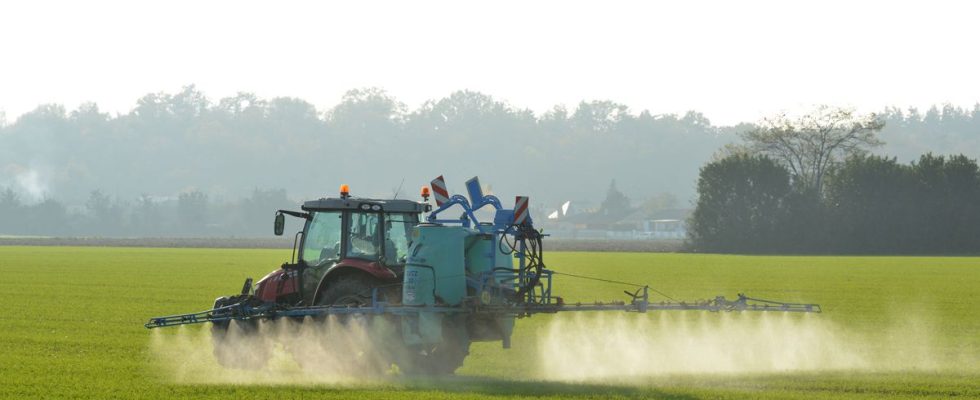From our fields to our urine, glyphosate infiltrates everywhere. A study published in January 2022 showed that 99.8% of the nearly 7,000 people tested in France had their urine contaminated. The most used pesticide in the world raises many concerns without international bodies being able to agree on its dangerousness. On Wednesday, the European Commission proposed renewing its authorization for ten years in the European Union. How will this decision be made? Why is the EU considering this renewal? What reactions does this provoke? 20 minutes takes stock for you.
What does the European Commission say?
The European Commission plans to renew the authorization of glyphosate for ten years. This proposal will be examined on Friday by representatives of the 27 member states, who will then have to validate it by a qualified majority during a vote on October 13. The current authorization of glyphosate in the EU, renewed in 2017 for five years, expired on December 15, 2022.
It was extended for one year pending a scientific evaluation by the European Food Safety Authority (EFSA). It finally indicated in July that it had not identified any “area of critical concern” in humans, animals and the environment likely to prevent the authorization of the herbicide. The Commission therefore proposes to authorize glyphosate until December 15, 2033, i.e. for a period twice as long as the previous authorization, but short of the period of fifteen years initially planned.
The green light may be revised at any time if new evaluations warrant it. Brussels establishes some safeguards: the use must be accompanied by “risk mitigation measures” concerning the surroundings of the sprayed areas, via “buffer strips” of five to ten meters and equipment drastically reducing “spray drift “. Use for desiccation (spreading to dry a crop before harvest) is now prohibited.
Why is glyphosate worrying while dividing?
Glyphosate, the active substance in several herbicides, was classified in 2015 as a “probable carcinogen” for humans by the International Agency for Research on Cancer of the World Health Organization. Monsanto, and its German parent company Bayer, have been entangled for years in multiple and costly legal proceedings in the United States, linked to the use of the weedkiller Roundup, which contains it. The group notably concluded a $10 billion agreement in 2020 to settle the lawsuits of its former users.
A group of experts from the National Institute of Health and Medical Research (Inserm) in France subsequently concluded in 2021 that “the existence of an increased risk of non-Hodgkin lymphomas with an average presumption of a link” with glyphosate. For its part, the EFSA simply noted “a high long-term risk in mammals” for half of the proposed uses of glyphosate, but recognized that the lack of data prevented any definitive analysis. Finally, the European Chemicals Agency (ECHA) ruled last year that the available scientific evidence did not allow it to be classified as a carcinogen.
What reactions does this possible renewal provoke?
Pascal Canfin, president (Renew, Liberals) of the Environment Committee of the European Parliament, deplores the absence of “serious restrictions on use”. The elected official denounced a “proposal that does not comply with the conclusions of the EFSA, which point to many gray areas”.
“By destroying biodiversity, glyphosate endangers our long-term food security. This proposal is irresponsible,” criticized Greens MEP Benoît Biteau. “Industrial interests clearly take precedence over health and the environment,” according to the environmental organization PAN Europe. In the columns of MediapartLaurence Huc, toxicologist and pesticide specialist, believes that “if European assessments were based on science, glyphosate would have been banned for decades”.
For his part, Christian Durlin, an official of the FNSEA agricultural union, sees “no element that could fuel a refusal to extend” the authorization, but warns of possible distortions in the rules of application between states. Furthermore, “we do not see the reasons to apply a buffer strip, it has not been demonstrated that there is a problem,” he adds.
What is France’s position?
In November 2017, Emmanuel Macron committed to implementing the ban on glyphosate “in three years at the latest”. “I have not changed my mind” on this objective, but “I did not succeed” in accomplishing it, recognized the Head of State in December 2020, considering that it was a “collective” failure. Since then, Paris has set itself the objective of eliminating the essential uses of this weedkiller. In 2020, ANSES announced progressive restrictions for its use in agriculture, its use by individuals having been prohibited since 2019.
On Wednesday, the European Commission’s proposal was deemed unsatisfactory by Paris, which advocates an “approach” according to which the use of glyphosate must be restricted only to uses for which there is no viable alternative. “France requests that this approach be harmonized at the European level,” underlined the Ministry of Agriculture. It remains to be seen whether Paris will manage to steer the debate opening in the European Commission in this direction.

